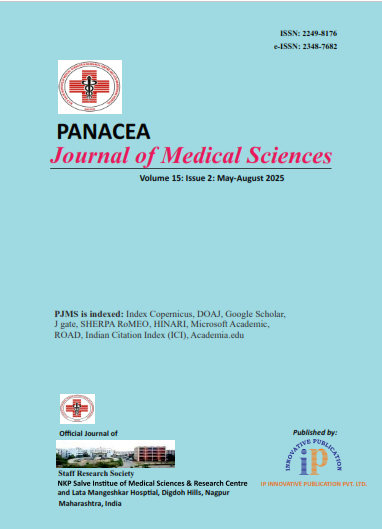Panacea Journal of Medical Sciences
Panacea Journal of Medical Sciences (PJMS) open access, peer-reviewed triannually journal publishing since 2011 and is published under auspices of the “NKP Salve Institute of Medical Sciences and Research Centre”. With the aim of faster and better dissemination of knowledge, we will be publishing the article ‘Ahead of Print’ immediately on acceptance. In addition, the journal would allow free access (Open Access) to its contents, which is likely to attract more readers and citations to articles published in PJMS.Manuscripts must be prepared in accordance with “Uniform requiremen...

An assessment of knowledge, attitudes, and practices on hand hygiene among medical students with in a healthcare facility
Page: 450-457
Background: Hospital-acquired infections (HAIs) are a significant concern globally. Horizontal transmission, where pathogens spread from one patient to another or from healthcare workers to patients, is a common route of transmission for hospital-acquired microbes. Factors such as inadequate hand hygiene, contaminated medical equipment, environmental contamination, and overcrowding can contribute to the spread of these pathogens within healthcare settings. Hand hygiene is one of the most critical meaure to prevent the spread of hospital-acquired infections. When performed effectively, it helps reduce the risk of healthcare-associated infections (HAIs) by removing harmful microbes from healthcare workers' hands, preventing the transmission of pathogens to patients and the surrounding environment.
Aim: To evaluate the understanding of hand hygiene practices and critical moments in its implementation among medical students of phase I,II, and III.
Materials and Methods: This study was done on a total number of 250 respondents who were enrolled in the MBBS curriculum in phases I,II and III in tertiary care hospital in India. A structured, self-administered questionnaire instrument was employed to evaluate hand hygiene, which consisted of three components: knowledge, attitude and self-reported practice regarding hand hygiene. The Z-test was applied to compare the percentage of correct responses between medical students, with a p-value of less than 0.05 regarded as statistically significant.
Result: A total 250 participants were surveyed to assess their knowledge, attitude regarding hand hygiene practices. The results revealed that majority (80.8%) of students had moderate knowledge regarding hand hygiene, with significant difference between the two groups. The study also revealed that the majority of students held poor attitudes towards hand hygiene. Phase II/III students had significantly better attitudes compared to phase I medical students however there was a significant difference between the two groups regarding the confidence with respect to knowledge in hand hygiene. Of the participants, 56% demonstrated good hand-hygiene practice, 26.8% had moderate practices and 17.2% showed poor practice.
Conclusion: Evaluating students' knowledge, attitudes, and practices related to hand hygiene is essential for understanding their awareness and behavior in preventing the spread of infectious diseases. The present study emphasizes the need for conducting regular training sessions on hand hygiene practices for healthcare workers. To develop a knowledgeable attitude and effective practices towards hand hygiene, education on the topic should be introduced early in the curriculum, with continuous training provided at regular intervals.
Article Metrics
- Visibility 18 Views
- Downloads 4 Views
- DOI 10.18231/pjms.v.15.i.2.450-457
-
CrossMark
- Citation
- Received Date September 01, 2024
- Accepted Date November 09, 2024
- Publication Date August 19, 2025